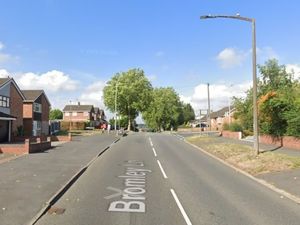Winson Green Prison: Inmates have 'easy access to drugs'
Drug use at a West Midlands prison is so prevalent that more than half of lags say it is 'easy' to get the illegal substances, according to inspectors.

Bosses at HMP Birmingham, formerly known as Winson Green, have been told to step up measures to combat drugs, which are brought in to the prison by visitors and drones.
The recommendation is one of 74 made by the Chief Inspector of Prisons, Peter Clarke - six months after a prisoner riot took place at the prison, which takes people from the Black Country.
Damage caused by riots resulted in the closure of modern accommodation, bringing the population down by 500 prisoners to 919, and leaving those remaining in older Victoria accommodation.
The inspection was carried out two months after the riot, from February 27 to March 4.
On security at the prison, the inspectors found procedures were 'mostly proportionate', although they said 130 serious incidents had happened at the prison since November.
The inspectors did raise concerns over the availability of drugs. The report said: "Drugs were widely available.
"In our survey, over half of all prisoners said it was easy to get illegal drugs, which was more than last time (last inspection in 2014) and higher than in similar prisons."
The report continued: "The use of mobile phones and drones to arrange and deliver drugs was identified as a significant threat."
The inspection urged prison bosses to work with West Midlands Police on combatting the issue with the use of technology such as signal blockers and mobile phone detectors.
Looking at the accommodation, the report found 'many' single cells were cramped and overcrowded, with some with broken windows or in a state of disrepair.
Another issue where improvements were needed was prisoner attendance for training and education. Inspectors feared money was being wasted on provision.
Inspectors did find positives from the visit.
They found many positive interactions between staff and prisoners and a good provision of health care.
Mr Clarke said: “The events of December 2016 had had a profound effect upon many members of staff.
"There was still, some two months later, a palpable sense of shock at the suddenness and ferocity of what had happened. Despite this, there was a very clear determination on the part of leadership and staff to move on from the disorder, rebuild and make progress."
He added: "This report is no more, and no less, than an account of the treatment of prisoners and the conditions in which we saw them being held during the period of the inspection.”
Michael Spurr, chief executive of HM Prison and Probation Service, said: “This report provides an overview of HMP Birmingham two months after the serious disturbance which took place on 16 December.
“There remains more to do to provide purposeful activity and to tackle violence and illicit drug use but the staff and the leadership team deserve credit for the commendable way they have responded to the challenges to date.
“We are determined to learn lessons from what happened at Birmingham and will work closely with G4S to achieve improvement.
"Additional staff are being recruited and G4S will use the recommendations in this report to drive progress over the coming months.”





